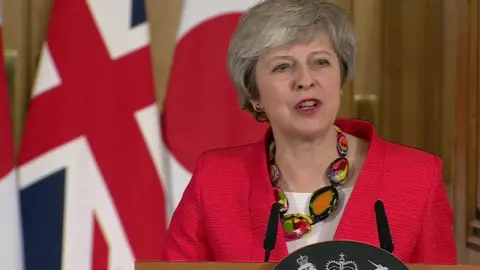Brexit: Theresa May calls union chiefs to seek support for deal
 BBC
BBCTheresa May has spoken to the leaders of two of the biggest unions in the UK as she continues to try to build support for her Brexit deal.
The PM spoke to Unite's Len McCluskey and the GMB's Tim Roache by phone on Thursday in what her spokesman described as "constructive" calls.
He said Mrs May was undertaking "widespread engagement" about the deal.
Mr Roache said he was glad the PM had "finally picked up the phone" but that her deal was not "good enough".
"If the deal genuinely did the job for GMB members, our union would support it, but it doesn't," he said.
"It's clear more time is required, we need to extend Article 50 and ultimately give the final say on Brexit to the public."
Mrs May also spoke to John Allan, president of the CBI business lobby group, as MPs continue to debate the EU withdrawal agreement her government has negotiated with the EU, ahead of next Tuesday's vote.
She has also met some Labour MPs as she continues efforts to build support for the deal, which more than 100 of her own MPs have said they will oppose.
Asked if she was still ruling out Labour's policy of a permanent customs union with the EU, after talking to the party's MPs and union leaders, she her deal would deliver an "ambitious" trading arrangements with the EU and allow the UK to strike trade deals around the world.
At a press conference with Japanese prime minister Shinzo Abe on Thursday, she said her deal was in the national interest "because it's a good deal and therefore I hope that it will get wide support across the whole of Parliament".
Speaking alongside Mrs May in Downing Street, Mr Abe said his country was in "total support" of Mrs May's EU withdrawal agreement and wanted to "invest more into your country and to enjoy further economic growth with the UK".
"That is why we truly hope that a no-deal Brexit will be avoided, and in fact that is the whole wish of the whole world," he added.
Allow X content?

It has emerged that the government is considering backing an amendment from Labour Leave supporter John Mann, giving extra protections to workers and the environment, in a bid to win support.
A number of Labour MPs in Leave-supporting constituencies back Mr Mann's amendment, which the MP said would open up the opportunity for other improvements to the prime minister's deal.
A spokesman for the prime minister said it was something they would "consider very seriously", adding that the government had "a long standing commitment to strong labour protections".
Mr Mann told BBC News his amendment would make it more likely for him to back the deal, but admitted it didn't mean other Labour MPs would be "rushing" to do the same.
But Labour Leader Jeremy Corbyn said his party did not "accept or endorse" what was on offer in the proposed amendment.
He said it has already been "quite clearly and emphatically rejected" by leading trade unions.

Analysis
By BBC political correspondent Chris Mason
The prime minister is hitting the phones - and the people on the other end are not regular recipients of telephonic greetings from Downing Street.
So what's happening?
Theresa May is reaching out.
Her proposed Brexit deal needs friends, and if that means phoning people who wouldn't count as such politically, then so be it.
The response from the trades unions has been less than gushing. One source told me they amounted to "eleventh hour, ten minute calls."
But, at the very least, it means Mrs May can say she is listening.
Even if those on the other end of the line don't like what they are hearing.

Greener UK - a group of 14 environmental organisations working on Brexit, including the RSPB and the Woodland Trust - said the aim of Mr Mann's amendment was "commendable", but it was not enough "to prevent a weakening of environmental protections or standards".
Meanwhile, during the second of five days of debate on the deal, Conservative MP George Freeman has told MPs he will now vote for it, having previously said he could not support it. He said it "wasn't perfect" and he hoped there would be more concessions.
But he added: "I will, with a heavy heart on Tuesday, vote for this deal because we are now in the dying stages and no-deal is unconscionable. But I beg colleagues to ask their front benches to work together across the house in pursuit of something we can all be proud of."
The government has lost two Brexit votes in two days. The first defeat limits the government's financial powers in the event of a no-deal departure. The second forces the PM to announce new plans within three days if her deal fails in the Commons.
Arlene Foster, leader of Northern Ireland's DUP which has helped the government win votes since June 2017, has warned the PM her deal is "already dead".
In a sign that the party has not been swayed by the government's promise to give the Northern Ireland Assembly a veto over any new EU regulations introduced under the terms of the proposed backstop arrangement, she accused Mrs May of "wasting time".
Senior Conservatives have continued to express opposition to the withdrawal agreement and declaration on future relations, negotiated by Mrs May in November.
The Labour Party will oppose Mrs May's deal next week, and push for a vote of no confidence if it is rejected by MPs, as Mr Corbyn believes that a general election is the most democratic way of breaking the Brexit deadlock.
The DUP says it will support the government in any confidence vote if the Brexit deal is rejected, making a defeat less likely.
